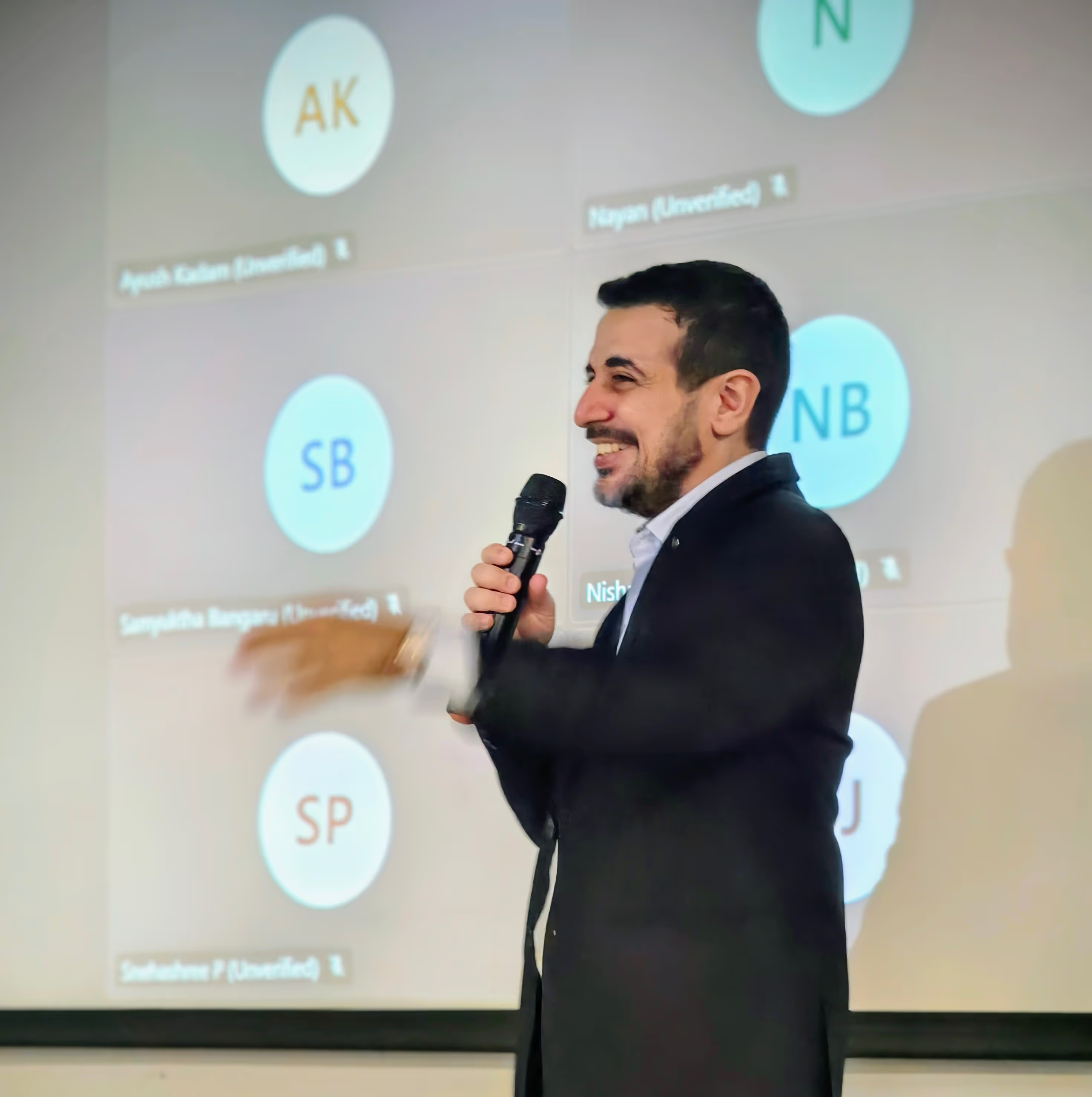
NLP for anxiety treatment is common across the world including India. With NLP techniques you can get an effective treatment for anxiety with an expert NLP trainer/ NLP coach / NLP practitioner.

Anxiety disorders are among the most common mental health issues worldwide, affecting millions of individuals in various ways. While traditional therapies like Rational Emotive Behaviour Therapy (REBT), Cognitive Behaviour Therapy (CBT) and medication are often prescribed, alternative approaches like Neuro-Linguistic Programming (NLP) have proven effective in managing and alleviating anxiety.
NLP offers unique tools that work with the mind’s natural processes, to change thought patterns, emotional responses and behaviours, thus offering individuals a path to healing by regulating their anxiety.



Neuro-Linguistic Programming (NLP) is an approach developed in the 1970s by Richard Bandler, John Grinder and Frank Pucelik.
NLP is based on the premise that there is a connection between neurological processes, language and behavioural patterns. Essentially, NLP explores how individuals perceive the world through their senses (neuro), how they structure and interpret this information using language (linguistic), and how this shapes their behaviour (programming).
With NLP, you can change the way you think, speak, and behave. Thereby achieve your desired outcomes.
NLP techniques are designed to reframe limiting beliefs, shift negative emotions and replace destructive thought patterns with more empowering alternatives.
These NLP techniques are widely applied in areas such as personal development, coaching, therapy and even professional growth.
One of the common aspects across people with different profession is anxiety, which can be healed with NLP techniques.
Anxiety disorders include a wide range of conditions, like generalized anxiety disorder (GAD), panic attacks, social anxiety, and phobias. While each condition has its own unique characteristics, they all share common elements: excessive worry, fear and a sense of being out of control.
NLP addresses these elements by helping individuals understand and alter the mental processes that lead to anxiety producing thoughts and feelings. Here are some ways in which NLP can assist in managing anxiety


Reframing Negative Thoughts:
One of the core principles of NLP is that, people can change how they perceive their experiences. This process is known as Reframing, where a person alters the context or meaning of a situation, often transforming a negative or anxious thought into a more neutral or positive one.
For example, a person with social anxiety might experience thoughts such as, “Everyone will judge me if I speak up,” which leads to feelings of fear and avoidance. Through NLP reframing techniques, the person can shift this belief to something more empowering, such as, “I can speak confidently, and if I make a mistake, it’s just part of my learning process.”
By challenging these limiting beliefs and replacing them with more constructive ones, NLP helps break the cycle of anxiety.
Many people with anxiety disorders engage in negative self-talk, such as “I’m not good enough” or “This situation is too overwhelming.” This internal dialogue creates a vicious cycle of anxiety, where the thoughts trigger anxious feeling, which then triggers more negative thoughts.
NLP helps inbreaking this cycle by teaching individuals to become aware of and interrupt their internal dialogue.
Through language patterns, NLP techniques such as Swish, which has pattern interrupt and NLP Reframing, 6 step reframing, NLP practitioners can guide individuals to shift their internal conversations into more supportive and resourceful narratives.
For instance, with language pattern, when faced with a stressful situation, instead of thinking, “I can’t handle this,” the individual might learn to reframe their thoughts to something like, “I can handle this situation just like I have done before.”


Anxiety often manifests as disturbing mental images — a person with anxiety might repeatedly visualize worst-case scenarios, such as an upcoming presentation going horribly wrong or imagining terrifying consequences of a situation.
NLP works by helping individuals to alter these images to something more neutral or even positive.
For instance, if someone with performance anxiety, constantly visualizes failing at a public speaking event, an NLP practitioner may guide them to change the image — making it smaller, black-and-white, or moving it further away. Over time, the brain begins to rewire its perception of the event, diminishing its emotional impact.
Conversely, an individual might be encouraged to visualize a successful outcome, reinforcing confidence and reducing fear.
NLP utilizes a technique called Anchoring, where an individual learns to associate a specific emotional state with a physical gesture or touch. For example, a person might anchor a sense of calm and relaxation to touching their thumb and forefinger together. When they are faced with an anxiety-provoking situation, they can use this anchor to bring themselves back to a relaxed, grounded state.
For someone experiencing panic attacks, this technique can be incredibly powerful. If a panic attack begins, the individual can use the pre-established anchor to induce a calming response, reducing the intensity of the attack or preventing it from escalating.


One of the more advanced NLP techniques taught in the Transformative NLP Practitioner courses used to treat anxiety is Timeline Therapy, which involves working with the subconscious mind to release emotional attachments to past events. In Timeline Therapy, individuals visualize their timeline of life, identifying moments when anxiety was created or triggered (often stemming from childhood experiences or past trauma).
By revisiting these moments and reframing them, individuals can release the negative emotional charge associated with those memories. This process helps them to move forward without the baggage of past experiences influencing their present behaviour.
It is particularly effective for those whose anxiety is linked to past traumatic events or long-standing fears.
Many individuals with anxiety have deep-seated beliefs about themselves or the world that fuel their anxiety.
These might include beliefs like “I’m not safe,” “The world is dangerous,” or “I can’t handle stress.”
These limiting beliefs can significantly impact one’s ability to function effectively in everyday life.
NLP practitioners work with individuals to identify these beliefs and challenge them, replacing them with healthier, more empowering ones.
For example, someone with the belief that they are always in danger might reframe that belief to, “I am capable of handling challenges as they come.”


1. Rapid Relief from Symptoms:
NLP is known for producing quick results. Many people report significant improvements after just a few sessions, experiencing a reduction in anxiety symptoms such as panic attacks, racing thoughts and excessive worry.
2. Empowerment and Self-Control:
NLP focuses on teaching individuals to take control of their mental and emotional states. Rather than feeling like victims of their anxiety, individuals become active participants in their healing process.
3. Long-Lasting Change:
NLP techniques target the root causes of anxiety, helping to create long-lasting shifts in thought patterns and emotional responses. Unlike temporary fixes such as medication, NLP can lead to a sustained change.
4. Holistic Approach:
NLP addresses anxiety at both the conscious and subconscious levels. It works not only with the surface-level symptoms but also with the underlying thought patterns, beliefs, and emotional triggers that contribute to anxiety.
5. Customizable for Individual Needs:
Because NLP is a flexible and adaptable approach, it can be tailored to suit the unique needs of each individual. This personalized approach ensures that clients receive the most effective treatment for their specific form of anxiety.


NLP offers a powerful set of tools for individuals struggling with anxiety disorders. By changing how people perceive and respond to anxiety-provoking situations, NLP helps them regain control over their thoughts, emotions and behaviours.
Whether through reframing negative thoughts, anchoring positive emotional states or addressing deep-seated beliefs, NLP offers a comprehensive approach to healing that can complement traditional therapies or stand alone as an effective treatment.
Thus, when dealing with anxiety, consulting with an NLP practitioner could be a transformative step in one’s journey towards emotional well-being and mental clarity. With its practical, action-oriented techniques, NLP empowers a person to break free from the grip of anxiety and reclaim his/her life.